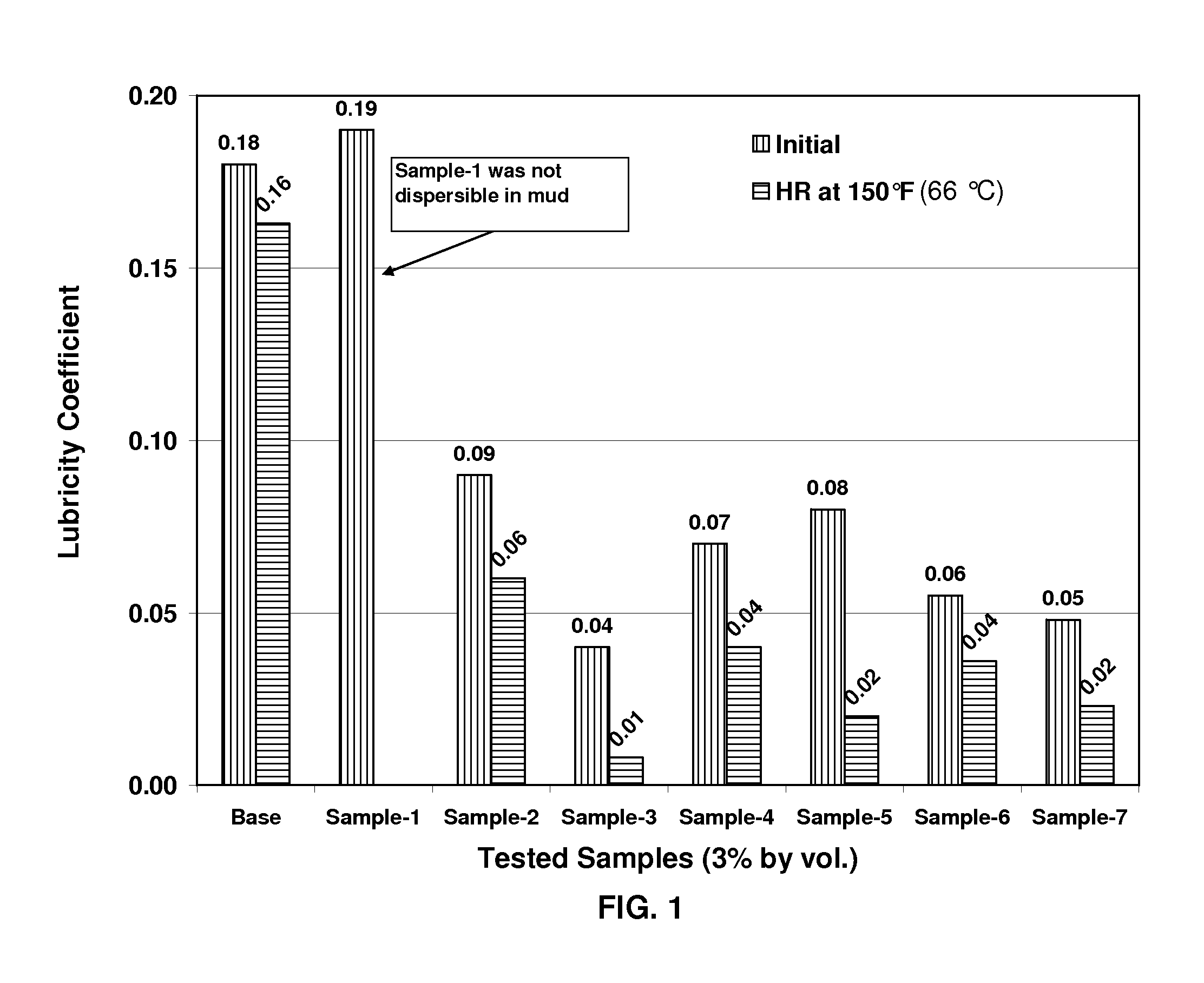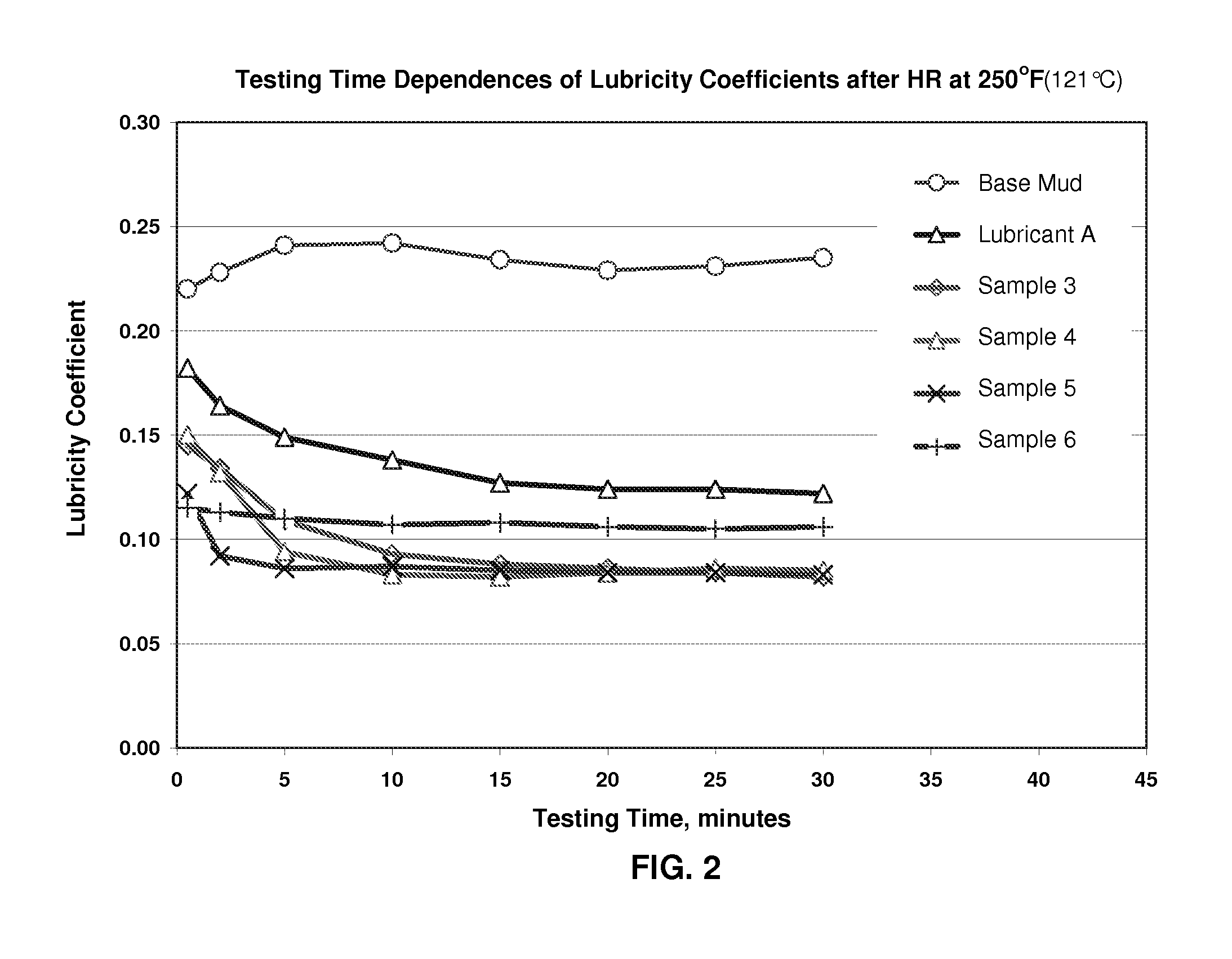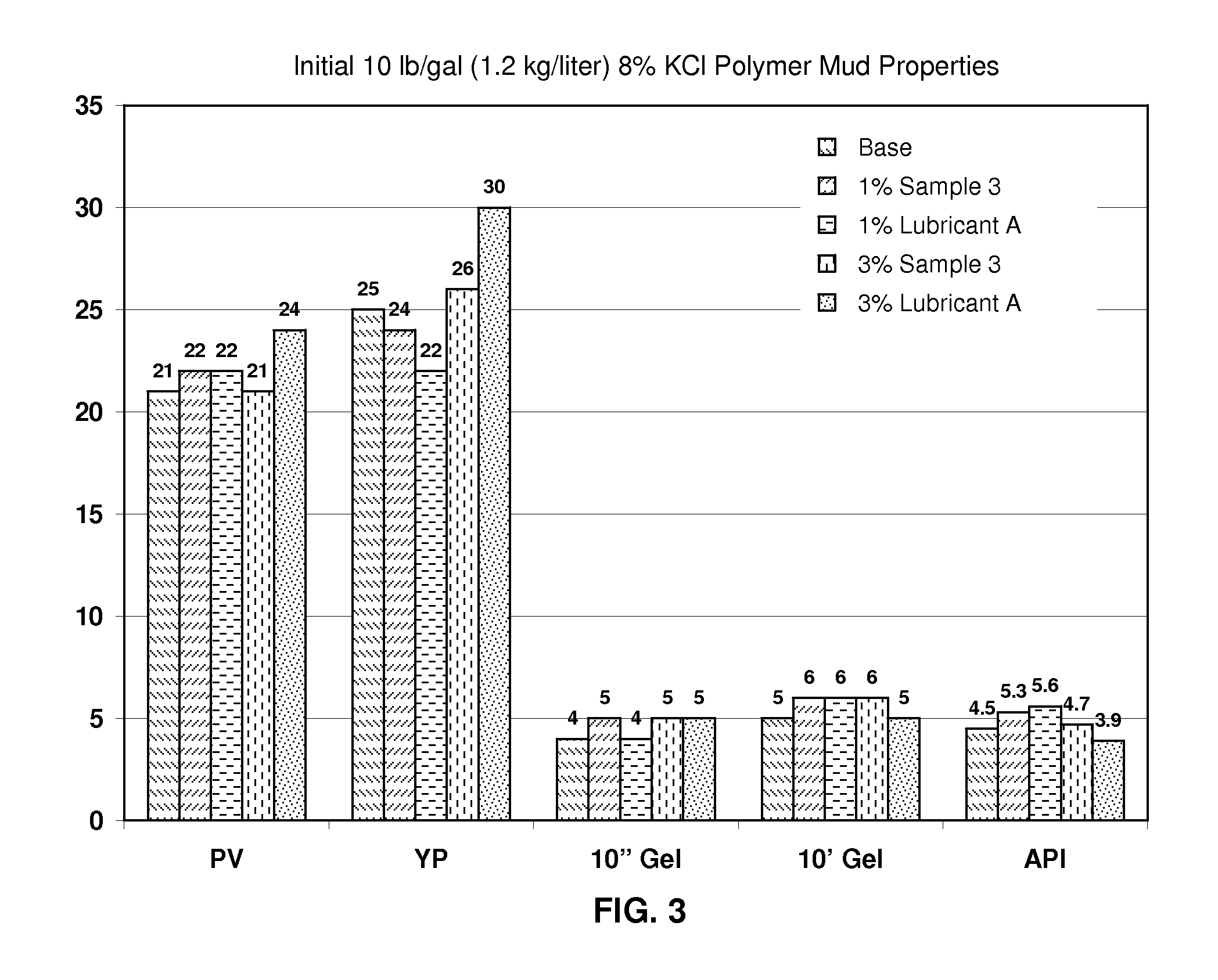Water-Based Mud Lubricant Using Fatty Acid Polyamine Salts and Fatty Acid Esters
a technology of fatty acid polyamine salts and lubricants, applied in the field of conducting operations, can solve the problems of pipe twisting or breakage, reducing the drilling rate,
- Summary
- Abstract
- Description
- Claims
- Application Information
AI Technical Summary
Benefits of technology
Problems solved by technology
Method used
Image
Examples
example 1
[0027]A synergistic effect between fatty acid salts of diethylenetriamine (DETA) and fatty acid esters on improving water-based mud lubricity has been observed. The fatty acid esters used in these Examples are fatty acid esters of 1,3-dioxane-5,5-dimethanol. As shown in FIG. 1, the samples made by blending fatty acid salts of DETA and fatty acid esters (Sample 3, Sample 4, Sample 5, Sample 6 and Sample 7 in Table II) demonstrate much better lubricity in waterbased drilling fluids than those fluids where only fatty acid salts of DETA (Sample 1 in Table II) or only fatty acid esters (Sample 2 in Table II) are used.
TABLE IBASE MUD FORMULATION FORTHE TESTS SHOWN IN FIG. 1Water, bbl (liter)0.82(130)MILGEL ®, lb (kg)6(2.7)XAN-PLEX ® D, lb (kg)0.3(1.4)NaHCO3, lb (kg)0.5(0.23)NEW DRILL ® PLUS, lb (kg)0.5(0.23)BIO-LOSE ®, lb (kg)2(0.91)MIL-PAC ™ LV, lb (kg)1(0.45)KCl, lb (kg)25(11)MIL-BAR ®, lb (kg)153(69)Rev Dust, lb (kg)27(12)
TABLE IILABORATORY SAMPLE COMPOSITIONSTestedLubricitySamplesLubr...
example 2
[0028]After aging at 250° F. (121° C.) for 16 hours, these laboratory samples performed better than a standard lubricant used in drilling fluid industry. FIG. 2 shows the comparison of the time dependence of lubricity coefficient for laboratory samples with a commercial available lubricity product termed “Lubricant A” herein (a mixture of fatty acids, esters with polyol and fatty acids C16-18 and C18-unsaturated compounds with 2,2,2″-nitriloethanol) after aging at 250° F. (121° C.) for 16 hours (sample compositions are shown by Table II). It may be seen that the lubricity coefficient is lowest for Samples 3, 4, 5 and 6 of the present composition in contrast to the base mud only and the commercial lubricant.
TABLE IIIMUD FORMULATION USED FORTHE TESTS SHOWN BY FIG. 2Water, bbl (liter)0.82(130)MILGEL, lb (kg)6(2.7)NaOH, lb (kg)0.4NEW-DRILL PLUS, lb (kg)0.5(0.23)MIL-PAC LV, lb (kg)1(0.45)BIO-LOSE, lb (kg)4(1.8)ALL-TEMP ™, lb (kg)1(0.45)KCl, lb (kg)25(11)Malay Barite, lb (kg)153(69)Rev Du...
example 3
[0029]Further comparison of a 50 / 50 vol / vol blend of fatty acid salt of DETA and fatty acid ester-1 with commercially available Lubricant A in 10 lb / gal (1.2 kg / liter) 8% KCl mud system is made in Tables IV and V, and FIGS. 3, 4, and 5. Again, it may be seen that Sample 3 outperforms the commercial lubricant. This is particularly true with respect to the torque reduction results shown in FIG. 5.
TABLE IVCompositions of Fluids Used in Table V and FIGS. 3, 4 and 5Water, bbl (liter)0.89(141)0.89(141)0.89(141)0.89(141)0.89(141)Soda Ash, lb (kg)0.5(0.22)1(0.45)1(0.45)1(0.45)1(0.45)FLOWZAN ®, lb (kg)0.5(0.22)0.5(0.22)0.5(0.22)0.5(0.22)0.5(0.22)NEW-DRILL ® HP, lb (kg)3(1.4)3(1.4)3(1.4)3(1.4)3(1.4)MIL-PAC ™ LV, lb (kg)2(0.9)2(0.9)2(0.9)2(0.9)2(0.9)BIO-LOSE ®, lb (kg)3(1.4)3(1.4)3(1.4)3(1.4)3(1.4)MIL-CARB ®, lb (kg)10(4.5)10(4.5)10(4.5)10(4.5)10(4.5)KCl, lb (kg)24.1(10.9)24.1(10.9)24.1(10.9)24.1(10.9)24.1(10.9)LC-LUBE ™ FINE, lb (kg)10(4.5)10(4.5)10(4.5)10(4.5)10(4.5)Malay Barite, lb (kg)40.5...
PUM
| Property | Measurement | Unit |
|---|---|---|
| volume ratio | aaaaa | aaaaa |
| volume % | aaaaa | aaaaa |
| volume % | aaaaa | aaaaa |
Abstract
Description
Claims
Application Information
 Login to View More
Login to View More - R&D
- Intellectual Property
- Life Sciences
- Materials
- Tech Scout
- Unparalleled Data Quality
- Higher Quality Content
- 60% Fewer Hallucinations
Browse by: Latest US Patents, China's latest patents, Technical Efficacy Thesaurus, Application Domain, Technology Topic, Popular Technical Reports.
© 2025 PatSnap. All rights reserved.Legal|Privacy policy|Modern Slavery Act Transparency Statement|Sitemap|About US| Contact US: help@patsnap.com



